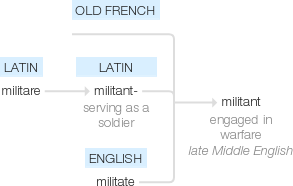Militant
late Middle English (in the sense ‘engaged in warfare’): from Old French, or from Latin militant- ‘serving as a soldier’, from the verb militare (see militate). The current sense dates from the early 20th century.
wiktionary
From Middle French militant, from Latin mīlitāns, present participle of mīlitāre(“to serve as a soldier”).
etymonline
militant (adj.)
early 15c., "fighting, engaged in warfare," from Old French militant "fighting" and directly from Latin militantem (nominative militans), present participle of militare "serve as a soldier" (see militate). The sense of "having a combative character or tendency," especially "seeking political change by use or advocacy of direct action," is by 1907. Related: Militantly.
Originally especially in Church militant (early 15c., chirche militans), which is the Church on earth, seen as engaged in warfare with the devil, the flesh, and worldly powers of temptation and unrighteousness. The Church triumphant (1550s) is the collective body of saints now glorified in heaven.
militant (n.)
c. 1600, "one engaged in war or strife," from militant (adj.); in the political sense of "one seeking change by use or advocacy of direct action" it is attested by 1909.
